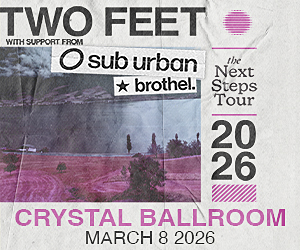Home > Jazz / Blues
01/19/2018
Jason Marsalis Quartet and Mel Brown’s B3 Band- 1/18/18 at Jack London Revue / A musician's review
By MICHAEL CONLEY // The percussionist/vibist comes to Portland. "...a tall, lanky person, and the vibes we're right up in the front of the stage, so the visual effect of his mallets scurrying across the keyboard or flashing on a trill in speedy-blurry back-and-forth motion was fun to watch.."
Mel Brown’s B3 band started the evening off at Jack London Revue with “Michelle's Blues” by saxophonist Renato Caranto, with an arranged intro featuring a martial drum feel and rhythmic hits with the band before kicking into cruising gear for the players to strut their stuff.
A Beatles medley came next including a swinging “Ticket to Ride” and “Let it Be”, with Caranto’s burly lead taking the melody and Dan Balmer plucking sweet and very slick harmonics from his guitar strings, both during his accompaniment and his solo. Caranto’s solo featured some wonderful ascending eighth note triplets and that great soul feeling he gets when he plays- commanding, yet lyrical and warm.
Powered by the lusty B3 organ of Louis ‘King Louie” Pain, this band can change up from a hard bop standard at a brisk 260 beats per minute to a heartfelt ballad, to Motown classics and pop hits from the 60s and 70s. The songs are jazzy yet so familiar that audience members often sing along to themselves. Watching Mel Brown navigate all of this is like a drumming master class in where to put accents, how to play quarter notes, eighth notes, and fills, or to play with economy if that's what the tune requires.
One standout number was a Jack McDuff piece called “The Vibrator”, with an insistent 16th-note lick that builds tension over an entire chorus of the form. Very nice, and obviously something that Dan Ballmer enjoys playing judging from his beaming smile.
Renato Caranto played the Jackson 5 hit “I'll Be There” with all the nobility the tenor saxophone is capable of, the reverence for the vernacular material shining through even in the split-tone screams and fast runs between money notes. Mr. Brown then performed an exciting solo to bring in the band on a cooking version of “Milestones”.
If you haven't heard this band and you live in Portland you owe it to yourself to go check them out- they are jazz players, they are R&B players, they rock, they groove and shuffle, they cook. They have a regular Thursday night residency at Jack London Revue, continuing a 20-year run from the now-closed Jimmy Mak’s. Full disclosure: this reviewer has been a regular guest of the band for years, sitting in on alto sax.
The headliner tonight was the Jason Marsalis Quartet featuring Louis Heriveaux on organ, Craig Shaw on upright bass, and Dave Potter on the drums. Marsalis is currently based in Orleans, France; his rhythm team hails from Atlanta. They are touring in support of a new album titled “Melody Reimagined: Book 1”. The project’s central idea is the contrafact, or basing new melodies on existing forms and chord structures, and Marsalis took time to explain the concept.
The first tune was “Ratio Man Strikes Again” based on Coltrane’s “Traneing In”. It had a really cool repeated five-note lick (with an alternating fifth note) in the beginning, setting the pace for a string of cooking solos.
The next contrafact was based on “You Stepped Out of a Dream” an old standard, and Marsalis gave another verbal intro explaining the piece has relevance to our current political climate before revealing the title- “Off the Rails”. Given the the playing on this I had a hard time believing he was thinking about politics when he played it because it was a pretty involved tune. It started off with a minimal staccato backing on the downbeats and built into a swirling juggernaut.
Keyboardist Heriveaux was killing it, though he claimed he had never touched an organ. However, I am certain that he has hung out in the organ patches from some of the electric keyboards that are out there. He had a good attack even if he was a little bit quiet- perhaps a bit tentative- as he generally plays piano. With the B3 on stage he rose to the road dog’s challenge of playing an unfamiliar axe with aplomb!
There's some interesting things about Marsalis’ technique. He is a tall, lanky person, and the vibes we're right up in the front of the stage, so the visual effect of his mallets scurrying across the keyboard or flashing on a trill in speedy-blurry back-and-forth motion was kind of fun to watch. He exhibited a playful nature during trades when he would suddenly stride away from the instrument at the end of a phrase, coming back when it was time for him to play again. He stuck to 2-mallet playing only. Some of Marsalis's other effects included different ways of squashing the the mallets on the keys to mute notes with the sustain pedal down, allowing other keys to ring freely.
Marsalis is unafraid of some of the brittle tones that can be produced by his instrument when the keys are struck extremely hard. It could produce a sort of piercing, hammered tone, but for him it was just another color to use as far as playing the instrument. The vibraphone, unlike a wind instrument, does not produce a lot of portamento- the in-between-the-pitch sound; each pitch is defined and distinct, though it can be quite evenly muddied with the vibrato of fan blades whirring in the resonator tubes.
Marsalis gave a lot of introductions between songs and I think these were scripted as jokes. While some of them were kind of amusing, he was also giving us information about where the music comes from and performance traditions in New Orleans and beyond. He also gave a shout-out to to Chris Brown, the son of Mel Brown, who is also a fine musician.
One of the set’s other highlights was based on “Seven Steps to Heaven” and there was one that Marsalis called a “ballad mashup” of Horace Silver's “Peace” and Charlie Haden’s “Silence” the melodic contours of which reminded me of “I Remember Clifford”, fittingly, as the song was indeed dedicated as a remembrance.
The vibist spoke about present-day New Orleans and their modernist melody on the bones of “Bourbon Street Parade” which was dubbed “Bourbon Street Ain't Mardi Gras”. This had really nice drums, great solos, and the re-imagined melody was very modern indeed. And there was something about this tune that had a really special feel.
Finally, one song had a Latin groove, very cool and slow with ringing long tones from Marsalis, and the organ solo was note-y but oddly quiet. Apparently it was based on the “maniac” song from the 1980s movie “Footloose”, a truly unexpected source for a jazz blowing vehicle.
The second set started with a 12-bar blues and it was really beautiful- everybody sounded in their element. I didn't recognize the head but it was one of those descending lines that are repeated over all the chords. They followed this with “You and the Night and the Music” played not as a contrafact but by actually playing the original melody. Marsalis took it out with a famous hard-bop piano line that he managed fit into the the changes.
A nice vibes cadenza opened “Soul Eyes”, the iconic Mal Waldron ballad, and this one had great brush work by Potter. Heraveaux’s solo somehow quoted from a nearly-forgotten funk anthem- it was pretty funny but it didn't sound out of place even on the slinky ballad. On this one Marsalis had a great ending cadenza as well, flashing some technique- a little bit of Bach to the Blues. I thought I heard something from “The Tonight Show Theme” in there also!
The band closed with something based on "Avalon", the old standard getting a modernist remake which was very fresh and featured some very fine playing by the whole band. I would relish hearing these players joined by another instrument, such as a horn, if not by one of the leader’s famous brothers.
This is the third great show by touring bands I have taken in at Jack London Revue, and I urge my fellow Portlanders to support these gigs and the locals that perform there as well.








